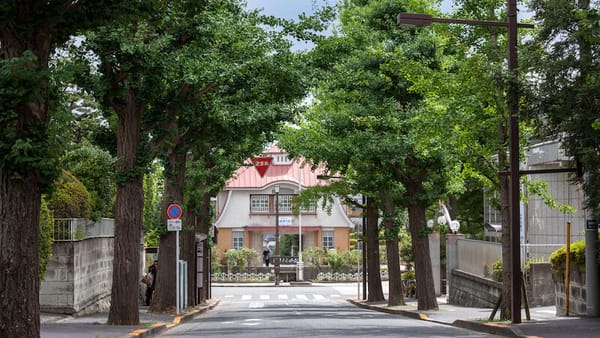“Sumimasen” Doesn’t Always Mean “Sorry”
More than “sorry,” sumimasen holds layers of gratitude, grace, and social awareness.

In Japan, “sumimasen” doesn’t always mean “sorry.” Learn how this versatile phrase expresses gratitude, humility, and social harmony — and how to use it strategically at work without undermining your confidence or authority.
You bump into someone on a crowded Tokyo train and say:
「すみません!」Sumimasen! “Sorry!”
Later, your colleague says it when you hand them a document:
「すみません、助かりました。」Sumimasen, tasukarimashita. “Thank you, that helped.”
And then your manager uses it to start a meeting:
「すみません、お時間いただいて。」Sumimasen, ojikan itadaite. “Sorry to take your time.”
Hold on—why is everyone apologizing all the time?
Here’s the quiet superpower every intermediate Japanese learner knows: “Sumimasen” in Japanese isn’t just about apology. Sometimes, it’s appreciation. Other times, it’s humility. Occasionally, yes, it’s regret. But more often, it’s a verbal cushion — smoothing over interactions like a soft breath in a tightly woven culture.
What “Sorry” Really Means in Japanese Culture
In many Western cultures, “sorry” is tied to admitting fault or legal responsibility. Saying sorry implies you did something wrong — and you’re ready to own it.
But in Japan, the emotional currency behind “sorry” is more nuanced. Apologies are less about guilt, and more about relationships. They’re a gesture of social intelligence — a way to affirm the group, soften hierarchy, and signal emotional care. When a Japanese person says:
「すみません」(sumimasen)
「申し訳ありません」(moushiwake arimasen)
…it may mean:
- “I acknowledge your effort.”
- “I recognize the space or time I’m taking.”
- “I appreciate you.”
- “I’m being considerate of your position.”
In short, apologies are about social alignment, not always wrongdoing.
The Many Shades of “Sumimasen”
Saying “Thank You” Without Saying “Thank You”
Imagine this: you deliver a report early. Your colleague says:
「すみません、助かります!」Sumimasen, tasukarimasu! “Thank you, that really helps!”
You pause. Why not just say arigatou?
Because sumimasen carries a different emotional flavor — it expresses humility and appreciation simultaneously. The speaker is acknowledging that your effort required something of you. It’s gratitude softened with social awareness.
In Tokyo offices, you’ll hear it dozens of times a day. It’s the unspoken way people say: I see you, and I’m grateful.
Starting Conversations with Softness
You’ll also hear sumimasen at the beginning of countless emails, meetings, and phone calls. Why?
Because it serves as a verbal bow — a gentle knock before entering someone’s mental space.
「すみません、お忙しいところ…」Sumimasen, oisogashii tokoro…“Sorry to bother you while you’re busy…”
Here, sumimasen doesn’t mean “I did something wrong.” It means, I understand your time is precious — and I’ll be respectful of it.
Strategic Apologies in the Workplace
When Apologizing Shows Strength
Contrary to what you might think, apologizing in Japan isn’t a sign of weakness. In many cases, it amplifies your authority and builds credibility — especially when done proactively. Here’s how it works:
1. Public Apologies = Leadership
When a manager says:
「ご迷惑をおかけして申し訳ありません。」Gomeiwaku o okake shite moushiwake arimasen. “I sincerely apologize for the inconvenience.”
They’re not groveling — they’re owning the team’s responsibility with grace. It signals maturity, transparency, and control of the situation.
2. Apologizing “Down” = Inclusive Leadership
When leaders say:
「急にお願いしてすみませんでした。」Kyuu ni onegai shite sumimasen deshita. “Sorry for the last-minute request.”
It communicates empathy. It honors the effort of subordinates, without undermining the hierarchy. It humanizes the person in charge.
Used thoughtfully, sumimasen becomes a bridge between power and kindness — one that women leaders in Japan are increasingly using to set a new tone.
The Trap of Over-Sumimasen
Of course, not all apologies are helpful. Foreign women — especially those new to Japan’s professional norms — sometimes fall into the trap of apologizing too much in an effort to be liked or seem “polite.” The problem?
Too many sumimasens can dilute your message and erode your perceived confidence.
Here’s a common email opening:
❌「すみません、少しお願いがあるのですが…」Sumimasen, sukoshi onegai ga aru no desu ga…“Sorry, I have a small request…”
This sounds hesitant — even insecure.
A better alternative?
✅「お忙しいところ恐れ入りますが…」Oisogashii tokoro osore irimasu ga…“I humbly ask even though I know you’re busy…”
The tone is still soft — but you maintain professional clarity without minimizing your own presence.
Apologies as Emotional Intelligence
One of the quiet superpowers of sumimasen is that it invites connection. It’s an emotional overture — a signal that you’re considering the other person’s time, effort, or dignity. That’s why you’ll hear sumimasen:
- As a thank-you to the Uber Eats driver
- As a greeting when passing a stranger in a narrow hallway
- As a placeholder for deeper gratitude, embarrassment, or affection
It’s the phrase people use when words fall short, but feelings remain strong.
“Sumimasen” vs “Gomen nasai”
Let’s clear this up. While both mean “sorry,” they’re not interchangeable:
- すみません (sumimasen) — More formal, versatile, often used to express thanks, make polite requests, or soften interactions.
- ごめんなさい (gomen nasai) — More direct, emotional, and often reserved for personal relationships or serious apologies.
You’d say gomen nasai to a friend if you forgot their birthday. You’d say sumimasen to your coworker when asking for a file. Think of sumimasen as a social cushion, and gomen nasai as an emotional balm.
Practice Situations: Use It Like a Pro
Here are some real-world workplace examples to practice with:
✅ Softening a Request
「お手数をおかけしますが、こちらご確認いただけますでしょうか?」Otesuu o okake shimasu ga, kochira go-kakunin itadakemasu deshou ka? “Sorry to trouble you, but could you kindly review this?”
✅ Acknowledging Effort
「すみません、忙しいところありがとうございました。」Sumimasen, isogashii tokoro arigatou gozaimashita. “Thanks for taking the time — I really appreciate it.”
✅ Exiting a Conversation Gracefully
「すみません、次の会議がありますので失礼します。」Sumimasen, tsugi no kaigi ga arimasu node shitsurei shimasu. “Sorry, I have another meeting to get to.”
Notice the flow? It’s soft. Considerate. But still clear and professional.
Use “Sumimasen” With Purpose — Not Just Politeness
“Sorry” in Japan is not a mark of guilt. It’s a tool — a finely tuned social instrument shaped by centuries of etiquette, empathy, and emotional intelligence. When used wisely, sumimasen allows you to:
- Express gratitude without boasting
- Apologize without self-blame
- Make requests without pressure
- Assert presence without domination
In Japan, communication often happens between the lines. And sumimasen is one of the most powerful lines there is.
Let Your Apologies Work For You
So the next time someone says:
「すみません、助かりました。」Sumimasen, tasukarimashita.
Know that they’re not just apologizing — they’re connecting. And the next time you say sumimasen, say it with intention. Because in Japanese culture, words don’t just carry meaning. They carry mood, relationship, and rhythm.
And sumimasen? It carries all three — wrapped in a bow of humility.
Enjoying this kind of thoughtful cultural deep-dive? Follow us on Instagram @coulecte and YouTube @coulectejapan for more insights, and don’t forget to sign up for our email newsletter to get the latest articles straight to your inbox.





